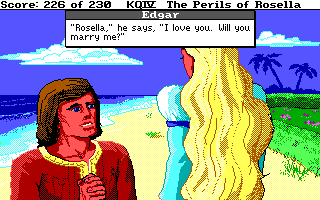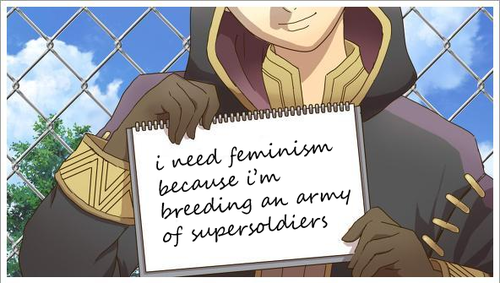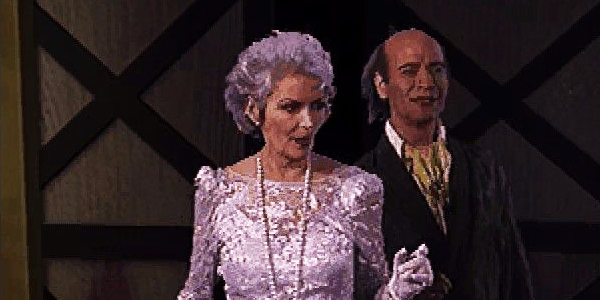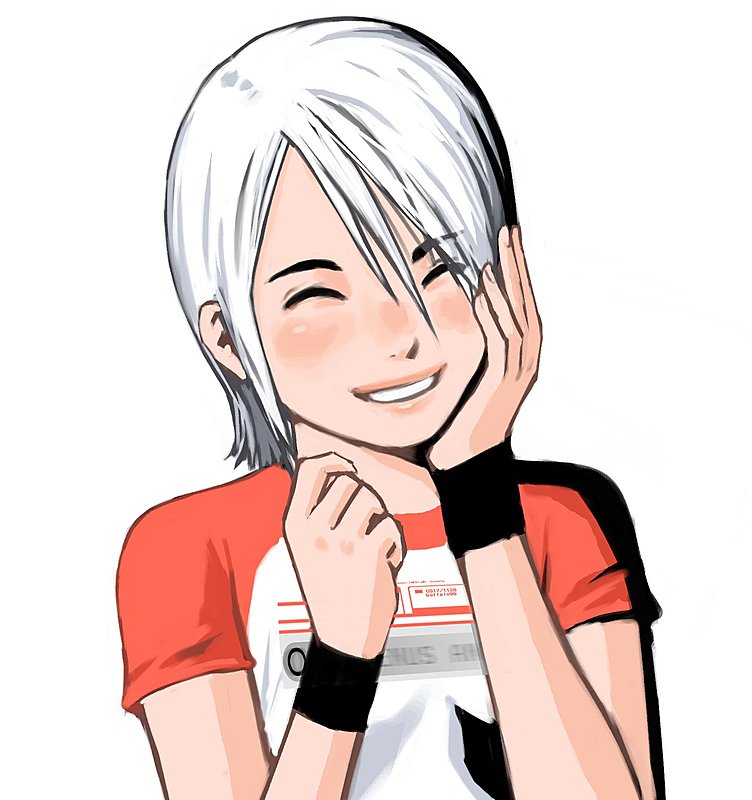Just popping in to say that Depression Quest is a stellar game that captures depression with uncanny accuracy and that technical proficiency is a silly metric by which to critique video games, especially in the current video gaming environment when less-technically-proficient video games are celebrated as equally as the mind-bogglingly futuristic AAA titles. Regardless of potentially shitty actions perpetrated by the creator and whatever genitalia may have orbited around her in personal moments.

Zoe Quinn debacle (The "Quinnspiracy")
#91

Posted 13 September 2014 - 10:19 AM
#92

Posted 13 September 2014 - 12:01 PM
Depression Quest did exactly what she intended it to do -- it was never meant to be anything more than that, and all the hype that's gone up around it is strictly due to GamerGate. It was never intended to be anything more than an introspective, informative text game. And it primarily deals with those who are already suffering from crippling depression and feel that there's no way out. It's an interactive aide that illustrates the importance of therapy, coping mechanisms, reaching out to others, and medicine for clinical depression. It's not flashy. It's not fun. It's just an aide. And given the prevalence of suicide and depression these days, it's important to have these kind of aides.
As for 4chan's involvement, it may not have been a large-scale mobilization, but the IRC chats she logged clearly involved people who frequent it. I highly doubt she went to such great lengths as to fabricate that entire thing. The rest of 4chan seems to be trying to do damage control now. At least from the looks of things on twitter and social media -- I admittedly don't frequent 4chan myself and have no desire to.
I don't understand the continual and relentless need to go after Quinn even after all that's happened, especially given how small a game Depression Quest is. It's as if the end goal is to throw up random little arguments simply to get one additional person to break down and say "Yes, Quinn is a terrible human being, you were right all along."
#93

Posted 13 September 2014 - 12:19 PM
I went through depression. This game doesn't encapsulate it. Perhaps mines was just different. I dunno. Maybe less severe?
As for the IRC, you can't directly prove that they were made by people of 4chan. Hell, you can't even prove that I visit 4chan (even though I've clearly stated that I do). 4chan is a public square. Everyone puts thei ideas up there, anonymously. And it's entirely possible for someone to post there, screenshot it and then play the martyr. And I know the question then asked is "to what end?"
Well, she does have quite a lot to gain by faking bullshit drama. For one, after her "attack" from wizardchan, her game was almost instanty greenlit, meaning that any future game she decides to make, no long has to go through the greenlight process and proceed directly to Steam. And secondly, she gets more notoriety in the gaming industry as a whole, just like Sarkeesian. Which makes it easier for her to ask for money. After the "attacks" (and yes, I will put them in quotations, because they don't seem to be the least bit real), her patreon account went up by nearly $1000. She gets paid about $3000 a month to literally play the victim, while shaming an industry's fanbase with bullshit.
That's why this is being discussed. Though, admittedly (as I've said before), it's moving away from her now and more at the game journalists who have been carrying the dogma. And rightfully so. Zoe Quinn through this entire thing is either manipulative and duplicitous or MONUMENTALLY thick. Either way, the best course of action is to ignore her. If she's playing the martyr, the best way to hurt her bullshit is to ignore her. And if she truly wishes to be left alone, then the kindest thing to do would be to grant that wish. So you're right, Selena. Zoe personally should not (and hasn't been, for the most part) the center of criticism anymore.
#94

Posted 13 September 2014 - 01:06 PM
Yeah, this was a PR stunt. Likely Quinn had some help doing it, but it was a PR stunt.
Depression Quest has a fair concept to it, and I do like the way its mechanics encourage role-play--if you can call clicking on a text box a role-play mechanic--but the production values are SO LOW that there's no way it would have gotten any exposure at all had Quinn not done something crazy just as it was going out the door. I mean, seriously. 95%+ of AddictingGames flash games have higher production values than that. Considering how many people have had depression, I'm sure there are a hundred projects like this out on the net, buried by the ocean of content. Heck, you could probably find something like this dating back to the internet's precambrian Bulletin Board days.
I imagine someone told her the best way to promote the game and rise above the riff raff is to make a BIG STINK, because no exposure is bad exposure. And the depressing thing is it actually worked.
#95

Posted 01 November 2014 - 10:51 AM
I know you don't want another GamerGate argument to start on this forum, but there's an article I'd like to link to because it's a lot more revealing than many articles that talk about online trolling. In particular, it talks about the troll tactic of baiting other people to harass their targets using well-known hot button issues like censorship. I've managed to keep myself out of the whole GamerGate disaster but I'm still aiming to be more skeptical of these kinds of accusations in the future.
http://www.wired.com...ill-always-win/
#96

Posted 03 November 2014 - 02:26 AM
I know you don't want another GamerGate argument to start on this forum, but there's an article I'd like to link to because it's a lot more revealing than many articles that talk about online trolling. In particular, it talks about the troll tactic of baiting other people to harass their targets using well-known hot button issues like censorship. I've managed to keep myself out of the whole GamerGate disaster but I'm still aiming to be more skeptical of these kinds of accusations in the future.
Really interesting article. Thanks for sharing. It is quite long, but worth persevering with.
The comments below the article are informative (in a depressing sort of way), as at least one poster exhibits exactly the kind of trolling behaviour described in the article. Distorting the author's opinions, suggesting that she deserved to be subjected to abuse and playing down the seriousness of the 'Doxxing' she suffered (contrary to the evidence presented).
#97

Posted 03 November 2014 - 05:21 AM
A similar thing is happening for people of colour. I remember a Daily Show episode where they got a group of black people together in a room to discuss their experiences with racism. They then got a group of white people together in a room who proceeded to accuse black people of exaggerating their claims and playing victim cards. The white people's line of reasoning was much the same as the people who deny harassment of women; "If I'm not seeing it, it must not be happening."
#98

Posted 03 November 2014 - 11:04 AM
A similar thing is happening for people of colour. I remember a Daily Show episode where they got a group of black people together in a room to discuss their experiences with racism. They then got a group of white people together in a room who proceeded to accuse black people of exaggerating their claims and playing victim cards. The white people's line of reasoning was much the same as the people who deny harassment of women; "If I'm not seeing it, it must not be happening."
I guess part of the problem (of the defensive reaction/denial) is that by grouping people together and informing them that people of their ethnicity are oppressing a minority it is implied that they personally share some responsibility for this. It is understandable that the thought process runs, 'I'm a white person, I do not hold racist views myself and do not regularly observe racist discrimination; therefore there is no problem'. Which is where some objectivity is needed to consider a wider range of evidence than just your own personal opinions and experiences.
My initial reacion to the opening paragraphs of the 'Why the Trolls Will Always Win' article was not disimilar to this. Especially when an allusion was made to the use of quotas to aid minorities; I have an intense dislike of this concept - arbitrary discrimination cannot be the solution to arbitrary discrimination (to be put this in context the article references this as an example of how trolls manipulate forums by utilizing memes that are commonly held, rather than critiquing the validity of the concept). Howvever, the author went on to provide several examples of behaviour toward her that was both illegal and morally repugnant. As I said above some of these attacks are repeated in the comments beneath the article - specifically that the author is fighting a campaign in favour of censorship.
#99

Posted 03 November 2014 - 11:57 AM
I guess part of the problem (of the defensive reaction/denial) is that by grouping people together and informing them that people of their ethnicity are oppressing a minority it is implied that they personally share some responsibility for this. It is understandable that the thought process runs, 'I'm a white person, I do not hold racist views myself and do not regularly observe racist discrimination; therefore there is no problem'. Which is where some objectivity is needed to consider a wider range of evidence than just your own personal opinions and experiences.
I think the problem of denial also has a lot to do with the idea of privilege. Privilege is a matter-of-fact thing that exists in our society, and yet the term is charged. It carries a tone of accusation, as if the privileged person got through life by illegitimate means. People don't like the idea that their work or importance is devalued by their privileged status so they are quick to deny or diminish the existence of privilege. And it's a subconscious thing, even sympathetic and intelligent people do it.
There is actually an educational game for classrooms that demonstrates the problem incredibly well (although for the life of me I can't remember the name of it). The class is divided into separate groups and a teacher brings a bag around, allowing each group to remove a number of counters from it. There are different shapes of counters that represent different monetary values. After each turn, the groups are allowed to trade counters with each other. However, the teacher has secretly rigged the game. One group is allowed to take counters from a bag that contains only high-value counters while another group is given a bag that contains only low-value counters. None of the groups are aware of this.
As the game goes on and the disparity between the rich and poor groups get bigger and bigger, the poor group in most recorded examples eventually realises the game is rigged and accuses the rich group of getting an unfair number of high-value counters. And the rich group then usually denies that the game is rigged and throws accusations back at the poor group. It is then at the end that the teacher stops the game and reveals to everyone that it has in fact been rigged. For me, this is a great example of the psychology behind denial like this.
Edited by Raien, 03 November 2014 - 12:02 PM.
#100

Posted 27 February 2015 - 08:31 AM
I guess part of the problem (of the defensive reaction/denial) is that by grouping people together and informing them that people of their ethnicity are oppressing a minority it is implied that they personally share some responsibility for this. It is understandable that the thought process runs, 'I'm a white person, I do not hold racist views myself and do not regularly observe racist discrimination; therefore there is no problem'. Which is where some objectivity is needed to consider a wider range of evidence than just your own personal opinions and experiences.
I think the problem of denial also has a lot to do with the idea of privilege. Privilege is a matter-of-fact thing that exists in our society, and yet the term is charged. It carries a tone of accusation, as if the privileged person got through life by illegitimate means. People don't like the idea that their work or importance is devalued by their privileged status so they are quick to deny or diminish the existence of privilege. And it's a subconscious thing, even sympathetic and intelligent people do it.
There is actually an educational game for classrooms that demonstrates the problem incredibly well (although for the life of me I can't remember the name of it). The class is divided into separate groups and a teacher brings a bag around, allowing each group to remove a number of counters from it. There are different shapes of counters that represent different monetary values. After each turn, the groups are allowed to trade counters with each other. However, the teacher has secretly rigged the game. One group is allowed to take counters from a bag that contains only high-value counters while another group is given a bag that contains only low-value counters. None of the groups are aware of this.
As the game goes on and the disparity between the rich and poor groups get bigger and bigger, the poor group in most recorded examples eventually realises the game is rigged and accuses the rich group of getting an unfair number of high-value counters. And the rich group then usually denies that the game is rigged and throws accusations back at the poor group. It is then at the end that the teacher stops the game and reveals to everyone that it has in fact been rigged. For me, this is a great example of the psychology behind denial like this.
Sorry for resurrecting this thread (stumbled upon it reading up on what you guys n gals think of the whole gamergate thing [still don't fully understand it]), and wanted to add that there are multiple psychological factors at work in that game, not just possible denial;
Whether such a game is rigged or not is not really important of course; if the "unfair" distribution had occured by chance (as it very well could have), the groups would still have behaved like that. And the group with the lower value counters would have looked like fools in the end. So that game is not so much about denial, it is very much also about the illusion that chance corrects itself (which it doesn't) and that a certain chance outcome can't possibly have happened.
#101

Posted 03 March 2015 - 11:32 PM
So since this is a revived thread and since I'm revisiting the topic myself, I've come to the conclusion that despite everything I've learned I have absolutely no fucking clue what was going on here and what was actually accomplished. There was some business about a developer sleeping with a journalist and that journalist repaying that business with good press for her subpar game. And then people found out and the idea that journalists were issuing biased reviews for games bothered gamers (which I'm sure it has been happening for a lot longer than people realize but who am I to tell them otherwise?) And then something about this chick going "they hate my because I'm a girl developer and sexism and the patriarchy and cis male scum" (which by the way, CIS? What ever happened to calling a guy straight? Or does the C stand for Caucasian?) And suddenly gender inequality becomes and thing because some chick slept with some guy who happened to pad her game's review? And then some business about GTA V in Australia being pulled, more complaints of sexism, 4chan being accused of hacking and trolls everywhere trolls.
And so did anything ACTUALLY happen here as a result or was this whole mess just a gigantic circle jerk for people to use and abuse so they could argue about something from the figments of their self perceived struggles and conflicts?
#102

Posted 04 March 2015 - 01:40 AM
I am loath to delve back into the subject of GamerGate, but I will answer that cis is short for cisgender. It refers to a person whose gender identity is the same as their biological sex (as opposed to transgender, genderqueer, genderfluid, etc.). It doesn't have anything to do with race or sexual orientation. But I don't think I have the energy to talk about GamerGate right now. ![]()
#103

Posted 04 March 2015 - 03:24 AM
I DO.
The relevant facts first: a female developer had a relationship with a journalist. That journalist did not review her game nor did he have any assignment related to covering her game in any way at any point during or after their relationship.
Then another dude that she had a relationship with got bent and posted a bunch of his complaints about her on some forums, which included those false accusations of corruption.
People who were already mad about stuff like Anita Sarkeesian and other feminist-perspective critics also got real bent and started raising a stink about the corruption thing, because it was a good angle to use against the critics they didn't like (reminder: the initial accusations had already been addressed by several investigators and found untrue). People like Sarkeesian saw the renewed attacks against them and said 'hey, look, this is exactly what we've been talking about all along.' The reaction to the Zoepost and her subsequent treatment by the community was also illustrative of many of the things feminist commentators have been saying for years about culturally possessive attitudes about women. These things were worth pointing out. No one really expected the enormity of the excremental maelstrom that would follow.
So it started out as some idiot posting personal shit online for petty revenge on his ex. But it turned into an ongoing battle to try and convince gamers that it will benefit everyone if they could reevaluate some of their thought processes about other people, and generally treat people better and be willing to share their culture with women and others who are currently not considered insiders. And as obvious as all that sounds, a lot of people have gone pretty much all-in against it.
There was some stuff about press corruption, but the only actual instances found were related to huge companies that produce hugely popular games, so gamers were willing to ignore those in favor of harassing small developers and critics they didn't like (about accusations that, to belabor the point, still were not true).
And as to what was actually accomplished, well, that's ongoing. The people who have been raising the alarms about ethical breaches in games media have accomplished precisely dick except getting some fine print changed on a website or two, and they don't seem to have been all that concerned with it in the first place. The people who have raised concerns about the treatment and acceptance of women and transgendered people and other underprivileged groups in gaming culture have at least gotten a conversation going, and achieved some greater awareness of the things they want to make the world aware of. But actual progress in getting a culture to change for the better is slow. Lots of people who believe they are right will stand in the way and fight bitterly against it. But they're not right.
There's a lot of rage against feminists and people who support social justice and progress, because there's a lot of misunderstanding about what those things mean. Some of the misunderstanding is deliberate, some is not. The primary misunderstanding seems to revolve around this: the point of feminism is not to make men give up privileges and it's not to make anyone give up any privileges. It's to see that everybody gets access to those privileges instead of just those that have them now, because then it's a better culture for everyone, including the people who always had the privilege all to themselves. Because privilege is not a physical commodity, there's not a limited supply, and the things and ideas and cool stuff that can be accomplished in the world increase exponentially when more people have access and support.
Of course, there are plenty of people who don't believe that privilege is a thing, so this all sounds ridiculous to them. Those are the people at the root of the conflict - the ones who are just bewildered by the whole idea because it sounds crazy, and the crazy people talking about it have all this mysterious clout and popularity, and it's just us few brave men who see through the double-talk and stand against this nonsense that is being forced on us to shut us up and ruin our fun. Those are the people who make up #gamergate. They believe they're heroes fighting against censorship and politically correct tyranny, but they're actually just some guys trying to maintain the status quo, because the status quo has been good for them.
#104

Posted 04 March 2015 - 08:16 AM
Thanks Pogo, I couldn't have put it better myself. The only thing I would add is that there are also a lot of outspoken radicals on both sides who make those of us who are reasonable look bad, and only fuel the opposition by confirming their opinions... It also doesn't help much that prominent people like Sarkeesian lean more towards the radical side. Though again, I don't think they deserve hatred and harassment. I just wish we had better de facto 'representatives'. But isn't that always the story?
#105

Posted 05 March 2015 - 11:53 AM
Myself, I actually really loathe talking about it, as I've received a lot of hate mail recently for standing up for feminist ideals in this very context. But I can't let a bunch of psychoes rule my life, and also, my "Spikey" persona is only present in what I think are intelligent, long-standing and reasonable communities (like this one). Non-gamers that believe in equal rights like me, seem to hate me, too, simply for having a lot of critique on Anita Sarkeesian her videos; they say "Gamergate misogyny is the bigger issue here, so shut up about the quality of the content", or "we do need to discuss the content, just not now", and as far as "if you focus on her content and try and debunk it, it is the same as saying she deserves harassment" as if Anita has alone right© to discuss content and subsequently be harassed (which by the way, is extremely horrible, no person should suffer like that).
To avoid you getting lost in this HOLY WALL OF TEXT, I seperated it with spoilers a bit.
Rationally discussing without starting a flame war
Sarkeesian’s videos may do her professed cause more harm than good
Calling out “Sexist!”way too soon could make you look uninformed or dumb Objectivity, History, Positive examples Positive effects of Sarkeesian’s videoes
Edited by Spikey, 05 March 2015 - 02:10 PM.
#106

Posted 09 March 2015 - 02:15 AM
Right, let's clear the air.
GamerGate comes down to a bunch of self-conscientious gamers, afraid of real-world change coming to their fantasy realm and completely unaware that it isn't going to change their hobby in any negative way. That's really it. It became a bastion for legitimate sexists, misogynists (and the run-of-the-mill trolls who just spout bullshit for funsies) and no amount of self-policing will get rid of that.
I'm not a fan of Anita Sarkeesian. Her work is shoddy, I disagree with several of her stances (Bayonetta, Tomb Raider Reboot, Wonder Pink, etc.), she never really embarks on anything positive (Even to just hold up a game as example and say "more of this please, and here's why...") and her disclaimer at the start of her videos is about as effective as the cancer warning on a pack of cigarettes ("It's perfectly ok to like these games. Now I'm gonna spend the better part of 30 minutes to explain why these games are horrible and you're a horrible person if you like them."). But despite my feelings towards the quality of her work, she's still allowed to voice her opinion on it. Lately, people have been trying to compare her to Jack Thompson. And I feel that's too far of a stretch. California V. EMA made sure that a situation like Jack Thompson could never occur again. I feel that one of the big problems about GamerGate is that it does indeed take away from legitimate criticism of Anita Sarkeesian's work from actual personalities in the gaming industry. And I feel they hold back on criticism, both because they're afraid of being painted as the other side and that they don't want to give the other side MORE ammo to use. Collectively, a lot of gaming culture still has itchy trigger fingers from being blamed for all of society's ills for a generation (Obesity, Columbine, lack of social skills, etc). And they need to see that at the end of the day, it's not going to negatively effect them in the least bit.
Look at the landscape of games that have come out since this "horrible SJW revolution" have come about. What have we got that's so threatening? Gone Home? Depression Quest? A few more demographic catered to in Western RPGs? What's the big freakout here? You don't like Depression Quest (I don't)? Don't fucking play it. Simple as that. You don't like that you can have crazy gay Orc sex in Dragon Age: Origins(I can't I'm that enthused by it)? Then don't have crazy gay Orc sex.
Boom.
Done.
Yeah, I dislike Anita Sarkeesian. Yeah, I'm not a fan of people lining up to her particular brand of stupid. But at the end of the day, the games I like will still get made. And there are even some parts that I feel CAN be beneficial (just not when you have to sift through the rest of the bullshit that is Feminist Frequency). I have no problem whatsoever with developers trying to cater to minority or under-appreciated demographics. Despite all its flack, I actually enjoyed "Gone Home". And I'm playing through "Life is Strange" right now. They're good games*. And if better written females in games bring us more characters like the new Tomb Raider, Elizabeth Comstock, Amanda Ripley or Ellie from the Last of Us, then I'm all for it.
*Admittedly, Gone Home is kind of a one-and-done kinda deal, but I got it on Steam sale for $5, so I feel I got my money's worth.
#107

Posted 10 March 2015 - 10:06 AM
Yeah so basically most gamers who delve into the Sarkeesian thing think the same thing about the quality of the content. It boils down to what Hana-Nezumi said, "I just wish we had better de facto 'representatives'. But isn't that always the story?" Sarkeesian may have a point SOMEWHERE, but it is hidden in a load of bs, and most regular intelligent gamers don't really care about. Hell, I didn't really care until my mailbox was suddenly overloaded with a load of bs. It is so shocking how the discussion often polarizes even the most tightly knitted communities.



































